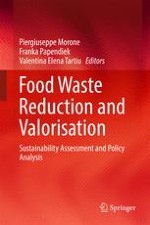2017 | OriginalPaper | Buchkapitel
15. Grassroots Innovations and the Transition Towards Sustainability: Tackling the Food Waste Challenge
verfasst von : Valentina Elena Tartiu, Piergiuseppe Morone
Erschienen in: Food Waste Reduction and Valorisation
Aktivieren Sie unsere intelligente Suche, um passende Fachinhalte oder Patente zu finden.
Wählen Sie Textabschnitte aus um mit Künstlicher Intelligenz passenden Patente zu finden. powered by
Markieren Sie Textabschnitte, um KI-gestützt weitere passende Inhalte zu finden. powered by
Abstract
-
how do grassroots movements act and how effective are they in catalysing innovation in the food waste field?
-
what are the specific roles that grassroots innovations may play in the transition towards sustainable production and consumption systems and a more sustainable waste regime?
